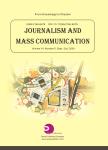Organizational Leadership in a Postmodern World: Practical Implications for Contemporary Religious Leaders
Organizational Leadership in a Postmodern World: Practical Implications for Contemporary Religious Leaders作者机构:California State University Channel Islands Camarillo USA
出 版 物:《Journalism and Mass Communication》 (新闻与大众传媒(英文版))
年 卷 期:2012年第2卷第12期
页 面:1139-1148页
学科分类:01[哲学] 0101[哲学-哲学] 081704[工学-应用化学] 010107[哲学-宗教学] 08[工学] 0817[工学-化学工程与技术] 081701[工学-化学工程]
主 题:postmodernism organizational leadership narrative paradigm communication privacy management(CPM) theory coordinated management of meaning (CMM)
摘 要:We live in an increasingly postmodern society. American Christianity, however, is imbued in a modem---even pre-modern--paradigm. As a result, many contemporary religious leaders find it difficult to communicate with their postmodern constituents, as evidenced by declining attendance rates and religious affiliation. The present study explores this dilemma by offering potential implications for contemporary religious leaders to communicate more effectively with emerging/emergent generation(s). The author begins this exploration, first, by outlining the philosophical tenants of postmodemism: its epistemological, ontological, and axiological assumptions. Second, the author delineates several key characteristics of postmodern religious communication. Next, the author offers three practical implications for organizational leaders: (1) increased use of personal narrative, (2) removal of hierarchal boundary structures, and (3) increased awareness and appreciation for divergent perspectives. The author concludes this study with directions for future research.



